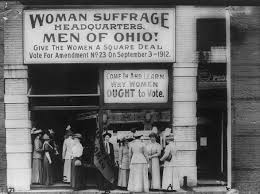记忆方法
1. On another theory (Watkins, etc.) the second element is frangere itself and the notion is "use a broken piece of tile as a ballot".
中文词源
suffrage 选举权,投票权
来自拉丁语 suffragium,投票,投票权,支持,来自 suffragari,投票,给予支持,来自 sub,在 下,向上,-frag,碎开,碎片,词源同 break,fragment.来自古希腊古罗马时期用碎瓦片碎骨片 投票的习俗。比较 ostracism,用碎骨片投票驱逐。
英语词源
- suffrage (n.)
- late 14c., "intercessory prayers or pleas on behalf of another," from Old French sofrage "plea, intercession" (13c.) and directly from Medieval Latin suffragium, from Latin suffragium "support, ballot, vote; right of voting; a voting tablet," from suffragari "lend support, vote for someone," conjectured to be a compound of sub "under" (see sub-) + fragor "crash, din, shouts (as of approval)," related to frangere "to break" (see fraction). On another theory (Watkins, etc.) the second element is frangere itself and the notion is "use a broken piece of tile as a ballot" (compare ostracism). Meaning "a vote for or against anything" is from 1530s. The meaning "political right to vote" in English is first found in the U.S. Constitution, 1787.
权威例句
- 1. She was active in the Society for Women's Suffrage.
- 她在争取妇女选举权协会中活动非常积极.
- 2. The question of woman suffrage sets them at variance.
- 妇女参政的问题使他们发生争执.
- 3. When was universal suffrage introduced in your country?
- 贵国是什么时候实行普选权的?
- 4. He was an advocate of universal suffrage as a basis for social equality.
- 他提倡普选权,认为这是社会公平的基础。
- 5. Between 1890 and 1930 the woman suffrage movement became exceedingly militant.
- 一八九○年到一九三○年间妇女争取选举权运动变得非常激烈.

